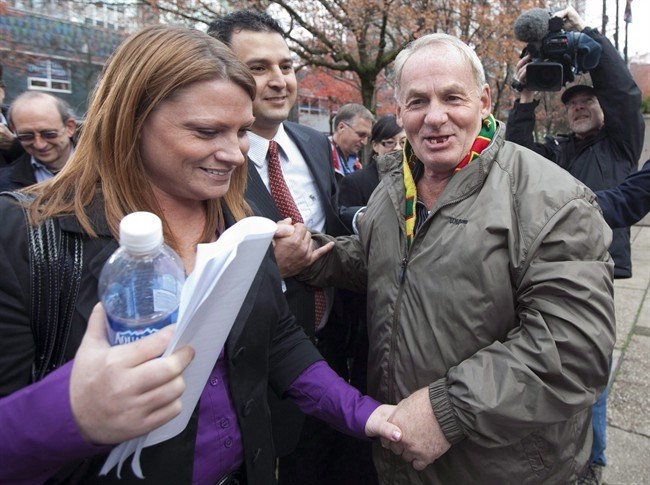
Ivan Henry, right, is seen with his daughter Kari Henry, left, outside the B.C. Court of Appeal in Vancouver on Oct. 27, 2010. The Supreme Court of Canada has ruled a B.C. man can use the Charter of Rights and Freedoms to pursue a lawsuit after being wrongly imprisoned for 27 years for sexual assaults he did not commit.
Image Credit: THE CANADIAN PRESS/Jonathan Hayward
May 02, 2015 - 10:26 AM
VANCOUVER - A Supreme Court of Canada ruling empowering a British Columbia man who was wrongly imprisoned for 27 years to sue the Crown may be the trigger for an out-of-court settlement, say observers.
The high court decision on Friday ruled that Ivan Henry can use the Charter of Rights and Freedoms to pursue a lawsuit after his life was upended by convictions for 10 sex crimes he did not commit.
The landmark ruling clarifies the circumstances under which criminal prosecutors may be sued if they fail to disclose evidence to accused persons.
"It is a great win for Ivan," said Vancouver author Joan McEwen, who spent hundreds of hours over three years with Henry to write a book on his case.
She predicted Henry is entitled to at least $10 million, but said the 68-year-old man's ailing health may put pressure on him to accept less.
"Because he's worried about dying and when he dies his case dies with him."
The federal government compensated David Milgaard — who spent 23 years in prison before being cleared of rape and murder with DNA evidence — with $10 million in 1999. Other high-profile payouts have included $6.5 million for Steven Truscott and $4.25 million for William Mullins Johnson.
Henry was convicted in 1983 of rape and indecent assault against eight women in Vancouver.
After a protracted bid for freedom, the B.C. Court of Appeal overturned the convictions. The court declared in 2010 that prosecutors had not fully disclosed evidence.
The next year he sued the provincial and federal attorneys general, the City of Vancouver and three members of its police department for withholding material that could have helped his defence.
His pending civil suit is scheduled to begin Aug. 31.
"We trust that this decision will now spur the government into finally making serious efforts to avoid a 100-day trial, which will only prolong Mr. Henry's suffering," said his lawyer Marilyn Sandford, while declining questions.
Neither B.C.'s attorney general, the federal justice minister, nor Vancouver Police would comment while the case is before the courts.
Criminology Prof. David MacAlister, at Simon Fraser University, said a seven-figure settlement is probable based on precedent and factors such as 27-years lost income, the hardships of being tagged a sex offender and separation from his daughters.
"We just don't see these big, dramatic trials in which a government tries to defend the actions of its prosecutors or police, who essentially pursued the wrong suspect," he said.
The ruling centres on a fine point of charter law, but it's one that has major ramifications over how criminal cases proceed every day in Canadian courtrooms.
Henry wanted to proceed with his lawsuit without having to prove the Crown's failure to disclose involved malice.
The government wanted the higher standard of malice to be upheld — to protect prosecutors from a flood of lawsuits — but the decision said it didn't need to be proven.
"No amount of money can restore to (Henry) the decades he has spent behind bars," Justice Beverley McLachlin writes.
"However, a monetary aware may offer some compensation for this long period of wrongful imprisonment and the many lost life opportunities it entails."
Henry's friend McEwen said that when he sometimes sounds bitter, it's based on roadblocks cemented by a system intent on avoiding admitting its mistakes.
"(Exonerees) want the people who put them in jail to be as held accountable, and pursued with as much zeal, as they were pursued when they were wrongly convicted."
Follow @TamsynBurgmann on Twitter
News from © The Canadian Press, 2015